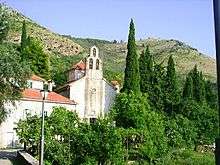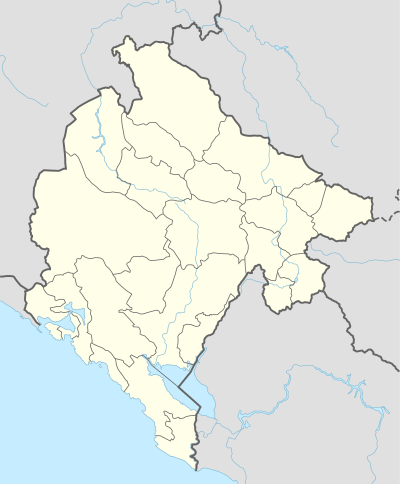Praskvica Monastery
Praskvica Monastery (Serbian Cyrillic: Манастир Прасквица) is a Serbian Orthodox monastery in Čelobrdo, a village in the Budva municipality in modern-day Montenegro. It was a spiritual and political center of the Paštrovići clan. The name of the monastery is taken from the peach-scented water of the nearby spring (praskva, diminutive praskvica, meaning a "peach").[1]
| Praskvica Monastery Манастир Прасквица | |
|---|---|
 | |
| Religion | |
| Affiliation | Serbian Orthodox Church |
| Ecclesiastical or organizational status | Metropolitanate of Montenegro and the Littoral |
| Location | |
| Location | Čelobrdo near Budva |
| State | Unknown (modern-day Montenegro) |
 Shown within Montenegro | |
| Geographic coordinates | 42°16′08″N 18°54′37″E |
| Architecture | |
| Completed | 1050 (according to the legend) |
Establishment
According to the legend, the monastery was founded in 1050, but the first document that mentions it was composed in 1307.[2] The document is a charter that Stephen Uroš II Milutin of Serbia issued during his visit to Kotor, in which he confirmed to the Church of the Holy Trinity the ownership over villages granted to the church by his mother, Helen of Anjou.[3]
Churches
Six churches belong to Praskvica Monastery.
Two churches are within the complex of this monastery. The older church is dedicated to the Holy Trinity while the other, built by Balša III and his mother Jelena[4] in 1413, is dedicated to Saint Nicholas.[5][6] The church was built in the Raška architectural school style.[7] In the same year a small house was built near the church.[3] After the church was reconstructed in 1847, only a part of one wall of the original church building remained.[8]
There are four churches on the Sveti Stefan island that also belong to Praskvica Monastery. One of them was destroyed by the communists during World War II, and was later turned into a casino.[9] The Church of Saint Stephen (Serbian: Црква Светог Архиђакона Стефана) is one of remaining churches on Sveti Stefan that belongs to Praskvica Monastery. Novak Djokovic married Jelena on 12 July 2014 in this church.[10]
Some of the monastery icons were painted in 1681 by a painter named Radul.[11] According to some stories, the cross of Emperor Dušan is kept in this monastery.[12] In 1813, when Montenegrin Littoral became part of the Illyrian Provinces, monastery was plundered by Napoleonic forces.[13]
Jegor Stroganov
There is a popular story about Jegor Stroganov, a one-armed Russian military officer who lived in the monastery as a monk from the late 18th century to the early 19th century. According to this story he came to Budva at the end of the 18th century and became a monk in Praskvica and pledged for silence.[14] At the beginning of the 19th century, he took ten years to build a 3-kilometer stone road from Sveti Stefan to the monastery.[15] This road is eponymously called "Jegor's Road" after him.[16] A drama by the same name, written by Serbian playwright Vida Ognjenović, was inspired by the story about Stroganov.[17]
See also
Notes
- Nebojs̆a Tomas̆ević (1982). Treasures of Yugoslavia: an encyclopedic touring guide. Yugoslaviapublic. Retrieved 13 June 2013.
- Velibor V. Džomić (2006). Pravoslavlje u Crnoj Gori. Svetigora. Retrieved 12 June 2013.
- Miroslav Luketić (1966). Budva, Sv: Stefan, Petrovac. Turistički savez. p. 163. Retrieved 15 June 2013.
- Boško Strika (1930). Srpske zaduzbine: Dalmatinski manastiri. Tiskara "Merkantile". p. 264. Retrieved 14 June 2013.
Ту је цркву године 1413 поднгао Балша III Стратимировић Балшић и његова мати Јелена, кћи косовског мучепика Св. Лазара
- Godišnjica Nikole Čupića. 1897. p. 205. Retrieved 13 June 2013.
- Justin Sp Popović (1975). Žitija svetih. Izdanje Manastire sv. Ćelije kod Valjeva. p. 463. Retrieved 13 June 2013.
манастир Прасквица са црквама Св. Троjице и Св. Николе,
- Vojislav J. Đurić; Gordana Babić-Đorđević (1997). Srpska umetnost u srednjem veku: XIV-XVI vek. Srpska književna zadruga. p. 123. Retrieved 15 June 2013.
Међутим, подижући 1413. године храм Св. Николе у манастиру Прасквици у Паштровићима, Балша III је учинио необичан подухват: обликовао га је угледајући се на рашко градитељство из XIII века.
- Srpsko geografsko društvo (1922). Glasnik Srpskog geografskog društva: Bulletin de la Société serbe de geographie. Srpsko geografsko društvo. p. 216. Retrieved 15 June 2013.
- "Манастир Прасквица". Metropolitanate of Montenegro and the Littoral. Archived from the original on 18 November 2012. Retrieved 12 June 2013.
- "Završeno crkveno vjenčanje Novaka i Jelene Đoković". nezavisne. Retrieved 12 July 2014.
- Сретен Петковић (1974). Manastir Sveta Trojica kod Pljevalja. Институт за Историју Уметности Филозофског факултета. p. 64. Retrieved 13 June 2013.
- Olga Moskovljević (1972). Svetlosti Mediterana. Matica srpska. p. 23. Retrieved 13 June 2013.
- https://www.bastabalkana.com/2014/07/manastir-praskvica-i-crkva-svetog-nikole-pored-svetog-stefana/
- "Jegorov put ponovo prohodan" (Press release). Novosti. 22 June 2004. Retrieved 2013-06-15.
Ovaj jedinstveni put od mora do sela Čelobrdo iznad Svetog Stefana, koji je u 19. veku izgradio Jegor Stroganov, koji je stigao u manastir Praskvica iz carske Rusije, pošto se zavetovao ćutanjem....koji ga je gradio punih deset godina.
- Miroslav Luketić (1966). Budva, Sv: Stefan, Petrovac. Turistički savez. p. 165. Retrieved 13 June 2013.
Пут од манастира Прасквице до Дуљева и даље до Паштров- ске горе израдио је крајем XVIII и почетком XIX ви- јека Рус Јегор Строганов,
- Pravoslavlje. Izdaje Srpska patrijaršija. 2007. p. 120. Retrieved 13 June 2013.
- "Dozvalo je očevo ćutanje" (Press release). Pobjeda. 20 June 2004. Archived from the original on 29 October 2013. Retrieved 2013-06-13.
Further reading
- Petar D. Šerović (1935). Manastir Praskvica. Bokeška štamp.
- Živopis manastira Praskvice, Dejan Vorgić
